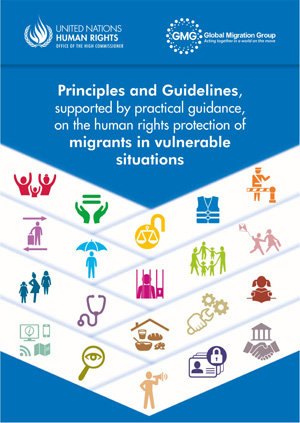Migrants in vulnerable situations
OHCHR and migration

Many people on the move today fall outside legal protection categories but are nonetheless in need of specific human rights protection interventions. The vulnerable situations that migrants face can arise from a range of situational and personal factors that may intersect or coexist simultaneously, influencing and exacerbating each other and also evolving or changing over time as circumstances change. Migrants may find themselves in vulnerable situations as a result of the situations compelling them to leave their country of origin, the circumstances in which they travel or the conditions they face on arrival, or because of personal characteristics such as their age, gender identity, race, disability or health status.
Migrants are not inherently vulnerable, nor do they lack resilience and agency. Rather, vulnerability to human rights violations is the result of multiple and intersecting forms of discrimination, inequality and structural and societal dynamics that lead to diminished and unequal levels of power and enjoyment of rights. As a matter of principle, and in order to ensure that every migrant is able to access appropriate protection of their rights, the situation of each person must be assessed individually.
OHCHR, working with other UN partners, has led the development of a set of Principles and guidelines on the human rights protection of migrants in vulnerable situations.
These principles and guidelines focus on the human rights situation of those migrants who may not qualify as refugees, yet who are in vulnerable situations and thus in need of the protection of the international human rights framework. They provide advice to States and other stakeholders on how they should implement their obligations to respect, protect and fulfil the human rights of migrants who are in vulnerable situations.
Related resources
- Guidance, UN, Principles and guidelines on the human rights protection of migrants in vulnerable situations (2018)
- UN Network on Migration, Regular Pathways for Admission and Stay for Migrants in Situations of Vulnerability. Guidance Note (2021) العربية | English | Français | Español
- Global mapping: OHCHR-DLA Piper, Admission and stay based on human rights and humanitarian grounds: a mapping of national practice (2018)
- Regional mapping: Pathways to migrant protection: a mapping of national practice for admission and stay on human rights and humanitarian grounds in Sia and the Pacific (2022)
- Technical note: OHCHR, Migrants and refugees (2018) English
- Technical note: OHCHR, What we mean by protection (2018) English
- Technical note: OHCHR, The principle of non-refoulement under international human rights law (2018) English
- Study, OHCHR-PDD, The slow onset effects of climate change and human rights protection for cross-border migrants (2018) English | Español
- Key messages, OHCHR, Human rights, climate change and migration English
- Technical note: OHCHR, Regular and irregular migrants (2018) English
- Technical note: OHCHR, The rights of irregular migrants (2018) English
- Video story, Marielle has lived and worked abroad for years, but in an irregular situation. Listen to the paradox she lives with every day – being both visible and invisible to society (2017)
- Promising practices: OHCHR, Examples of promising practices on the human rights protection of migrants in vulnerable situations (2016) English (Word)
- Report, OHCHR, Promotion and protection of the human rights of migrants in the context of large movements (2016)
- Report: OHCHR, Behind closed doors: protecting and promoting the human rights of migrant domestic workers in an irregular situation (2015)
- Key messages: OHCHR, 10 Key Messages on protecting the human rights of migrant domestic workers (2015)
- Documentary film: OHCHR, I am not here on undocumented migrant domestic workers (2015)